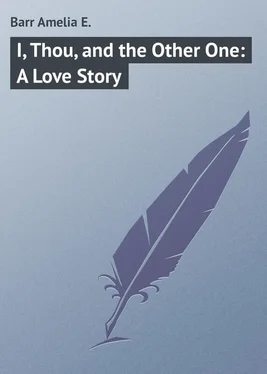Amelia Barr - I, Thou, and the Other One - A Love Story
Здесь есть возможность читать онлайн «Amelia Barr - I, Thou, and the Other One - A Love Story» — ознакомительный отрывок электронной книги совершенно бесплатно, а после прочтения отрывка купить полную версию. В некоторых случаях можно слушать аудио, скачать через торрент в формате fb2 и присутствует краткое содержание. Жанр: foreign_prose, на английском языке. Описание произведения, (предисловие) а так же отзывы посетителей доступны на портале библиотеки ЛибКат.
- Название:I, Thou, and the Other One: A Love Story
- Автор:
- Жанр:
- Год:неизвестен
- ISBN:нет данных
- Рейтинг книги:3 / 5. Голосов: 1
-
Избранное:Добавить в избранное
- Отзывы:
-
Ваша оценка:
- 60
- 1
- 2
- 3
- 4
- 5
I, Thou, and the Other One: A Love Story: краткое содержание, описание и аннотация
Предлагаем к чтению аннотацию, описание, краткое содержание или предисловие (зависит от того, что написал сам автор книги «I, Thou, and the Other One: A Love Story»). Если вы не нашли необходимую информацию о книге — напишите в комментариях, мы постараемся отыскать её.
I, Thou, and the Other One: A Love Story — читать онлайн ознакомительный отрывок
Ниже представлен текст книги, разбитый по страницам. Система сохранения места последней прочитанной страницы, позволяет с удобством читать онлайн бесплатно книгу «I, Thou, and the Other One: A Love Story», без необходимости каждый раз заново искать на чём Вы остановились. Поставьте закладку, и сможете в любой момент перейти на страницу, на которой закончили чтение.
Интервал:
Закладка:
Now if there had been a direct electric or magnetic current between England and the Continent, the effect could not have been more sympathetically startling; and these three memorable “Days of July” in Paris impelled forward, with an irresistible impetus, the cause of freedom in England. The nobility and the landed gentry were gravely aware of this effect; and the great middle class, and the working men in every county, were stirred to more hopeful and united action. Far and wide the people began anew to express, in various ways, their determination to have the Tory Ministers dismissed, and a Liberal Government in favour of Reform inaugurated.
For the first time the Squire was anxious. For the first time he saw and felt positive symptoms of insubordination among his own people. Pickering’s barns were burnt one night; and a few nights afterwards, Rudby’s hay-ricks. Squire Atheling was a man of prompt action; one well disposed to do in his own manor what he expected the Government to do in the country,–take the Reform bull by the horns. He sent for all his labourers to meet him in the farm court at Atheling; and when they were gathered there, he stood up on the stone wall which enclosed one side of it and said in his strong, resonant voice,–
“Now, men of Atheling manor and village, you have been sulky and ugly for two or three weeks. You aren’t sulky and ugly without knowing why you are so. If you are Yorkshiremen worth your bread and bacon, you will out with your grievance–whatever it is. Tom Gisburn, what is it?”
“We can’t starve any longer, Squire. We want two shillings a week more wages. Me and mine would hev been in t’ churchyard if thy Missis hed been as hard-hearted as thysen.”
“I will give you all one shilling a week more.”
“Nay, but a shilling won’t do. Thy Missis is good, and Miss Kate is good; but we want our rights; and we hev made up our minds that two shillings a week more wage will nobbut barely cover them. We are varry poor, Squire! Varry poor indeed!”
The man spoke sadly and respectfully; and the Squire looked at him, and at the stolid, anxious faces around with an angry pity. “I’ll tell you what, men,” he continued; “everything in England is going to the devil. Englishmen are getting as ill to do with as a lot of grumbling, contrary, bombastic Frenchers. If you’ll promise me to stand by the King, and the land, and the laws, and give these trouble-making Reformers a dip in the horse-pond if any of them come to Atheling again–why, then, I will give you all–every one of you–two shillings a week more wage.”
“Nay, Squire, we’ll not sell oursens for two shillings a week; not one of us–eh, men?” and Gisburn looked at his fellows interrogatively.
“Sell oursens!” replied the Squire’s blacksmith, a big, hungry-looking fellow in a leather apron; “no! no, Squire! Thou oughtest to know us better. Sell oursens! Not for all the gold guineas in Yorkshire! We’ll sell thee our labour for two shilling a week more wage, and thankful; but our will, and our good-will, thou can’t buy for any money.”
There was a subdued cheer at these words from the men, and the Squire’s face suddenly lightened. His best self put his lower self behind him. “Sawley,” he answered, “thou art well nicknamed ‘Straight-up!’ and I don’t know but what I’m very proud of such an independent, honourable lot of men. Such as you won’t let the land suffer. Remember, you were all born on it, and you’ll like enough be buried in it. Stand by the land then; and if two shillings a week more wage will make you happy, you shall have it,–if I sell the gold buttons off my coat to pay it. Are we friends now?”
A hearty shout answered the question, and the Squire continued, “Then go into the barn, and eat and drink your fill. You’ll find a barrel of old ale, and some roast beef, and wheat bread there.”
In this way he turned the popular discontent from Atheling, and doubtless saved his barns and hay-ricks; but he went into his house angry at the men, and angry at his wife and daughter. They had evidently been aiding and succouring these discontents and their families; and–as he took care to point out to Kate–evil and not good had been the result. “I have to give now as a right,” he said, “what thee and thy mother have been giving as a kindness!” And his temper was not improved by hearing from the barn the noisy “huzzas” with which the name of “the young Squire” was received, and his health drank.
“Wife, and son, and daughter! all of them against me! I wonder what I have done to be served in such a way?” he exclaimed sorrowfully. And then Kate forgot everything about politics. She said all kinds of consoling words without any regard for the Reform Bill, and, with the sweetest kisses, promised her father whatever she thought would make him happy. It is an unreasonable, delightful way that belongs to loving women; and God help both men and women when they are too wise for such sweet deceptions!
Yet the Squire carried a hot, restless heart to the Duke’s meeting that night; and he was not pleased to find that the tactics he had used with his labourers met with general and great disapproval. Those men who had already suffered loss, and those who knew that they had gone beyond a conciliating policy, said some ugly words about “knuckling down,” and it required all the Duke’s wisdom and influence to represent it as “a wise temporary concession, to be recalled as soon as the election was over, and the Tory Government safely reinstalled.”
Upon the whole, then, Squire Atheling had not much satisfaction in his position; and every day brought some new tale of thrilling interest. All England was living a romance; and people got so used to continual excitement that they set the homeliest experiences of life to great historical events. During the six weeks following the death of King George the Fourth occurred the new King’s coronation, the dissolution of Parliament, the “Three Days of July,” and the landing of the exiled French King in England; all of these things being accompanied by agrarian outrages in the farming districts, the destruction of machinery in the manufacturing towns, and constant political tumults wherever men congregated.
The next six weeks were even more restless and excited. The French King was a constant subject of interest to the Reformers; for was he not a stupendous example of the triumph of Liberal principles? He was reported first at Lulworth Castle in Devonshire. Then he went to Holyrood Palace in Edinburgh. The Scotch Reformers resented his presence, and perpetually insulted him, until Sir Walter Scott made a manly appeal for the fallen tyrant. And while the Bourbon sat in Holyrood, a sign and a text for all lovers of Freedom, England was in the direst storm and stress of a general election. The men of the Fen Country were rising. The Universities were arming their students. There was rioting in this city and that city. The Tories were gaining. The Reformers were gaining. Both sides were calling passionately on the women of the country to come to their help, without it seeming to occur to either that if women had political influence, they had also political rights.
But the end was just what all these events predicated. When the election was over, the Tory Government had lost fifty votes in the House of Commons; but Piers Exham was Member of Parliament for the borough of Gaythorne, and Squire Atheling was the Representative of the Twenty-two Tory citizens of the village of Asketh.
CHAPTER FIFTH
ANNABEL VYNER
The first chapter of Kate’s and Piers’ love-story was told to these stirring events. They were like a trumpet obligato in the distance thrilling their hearts with a keener zest and a wider sympathy. True, the sympathy was not always in unison, for Piers was an inflexible partisan of his own order, yet in some directions Kate’s feelings were in perfect accord. For instance, at Exham Hall and at Atheling Manor-house, there was the same terror of the mob’s firebrand, and the same constant watch for its prevention. These buildings were not only the cherished homes of families; they were houses of national pride and record. Yet many such had perished in the unreasoning anger of multitudes mad with suffering and a sense of wrong; and the Squire and the Lord alike kept an unceasing watch over their habitations. On this subject, all were unanimous; and the fears, and frights, and suspicions relating to it drew the families into much closer sympathy.
Читать дальшеИнтервал:
Закладка:
Похожие книги на «I, Thou, and the Other One: A Love Story»
Представляем Вашему вниманию похожие книги на «I, Thou, and the Other One: A Love Story» списком для выбора. Мы отобрали схожую по названию и смыслу литературу в надежде предоставить читателям больше вариантов отыскать новые, интересные, ещё непрочитанные произведения.
Обсуждение, отзывы о книге «I, Thou, and the Other One: A Love Story» и просто собственные мнения читателей. Оставьте ваши комментарии, напишите, что Вы думаете о произведении, его смысле или главных героях. Укажите что конкретно понравилось, а что нет, и почему Вы так считаете.












